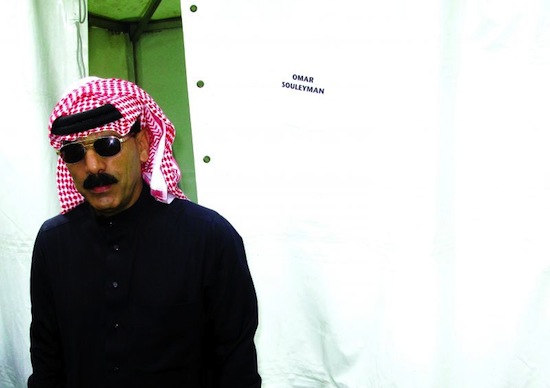Precariously up on the tips of my toes, I’m peeking over the crowd, trying to grab a glance of tonight’s star attraction. But the view’s obscured by one of the dozens of fucking smartphones suddenly raised high up in the air in a vain attempt to get that ‘one perfect Instagram’. I give in and turn my gaze to the guy who actually went ahead, brought a tablet along (currently some 15cm from my face) and it’s all there. The sunglasses, the keffiyah, his hands aloft swatting away the crowd’s delight in time to the stubbornly persistent dabke 4/4, and his cries of “yeeeeeeeah” emanating from the speakers ridden with delay. Omar Souleyman’s in town.
After his triumphant first westward excursions documented on 2011’s live release, Haflat Gharbia – The Western Concerts – as well as the dozens of photos and videos to emerge online – one would expect this to be an even grander affair than those initial Western debuts. The newly-opened (and possibly unfinished) basement venue in The Laundry – a building bought and developed by the unlikely owners of Ed O’Brien from Radiohead and Indian media mogul Raj Nayak – sets the knowingly ‘underground’ tone with the concrete-walled atmosphere of a semi-legal rave, requiring an extended detour into the dark back alleys surrounding London Fields, our route signposted with Sellotaped A4 signs ("← Omar Souleyman"). Eventually we find ourselves at the back of a crowd in a dark basement, already incessantly bouncing from the warm-up act. A single man enters from the left, and the set’s opening notes – a gentle, slow-building wall of instrumental keyboard ambience – introduce the evening’s first Middle Eastern modes. From off-stage, the singer starts, restlessly musing in foreign tongues, before joining his comrade on stage for the prologue’s final crescendo. And then the beat begins.
The recent release of Wenu Wenu – Souleyman’s first studio album made in the west, his first distributed by a larger label and an album recorded by none other than Four Tet – seemingly indicated a boundless ambition in the artist, an apparent desire to make western radio-friendly dabke a reality. From the looks of the crowd’s reaction to the extended, and somewhat beefed up revision of ‘Leh Jani’ that followed (a song that’s appeared in varying incarnations across the singer’s career, this time including a particularly bassy beat à la Wenu Wenu), it’s an ambition more than within the realms of reality. The universal four beats – the global common musical ancestor from Qawwalli to grime – seamlessly underpins almost the entire set, rendering it – save a handful of between-song breathers – effectively a single whole.
For reasons unknown, Souleyman’s band is now whittled down to just one man, his long-time composer/keyboardist Rizan Sa’id. The passages of saz solos – previously performed live – are now provided via samples and Sa’id’s skilful keyboard wizardry, and while in studio the partnership seems adequately credited merely to Souleyman, Sa’id’s live performance deserves more recognition, especially when he’s responsible for everything in your ears besides the vocals. His prowess with the pitch bend, ably replicating acoustic instruments (albeit with an intoxicatingly strange digital twist), is truly something to behold.
It’s a massively fun 45 minutes, with the long-serving dance-party veterans leaving me little choice but to stop thinking about what to write and clap and dance and sing instead. Besides ‘Leh Jani’, recognisable moments from the Souleyman catalogue crop up, namely ‘Shift Al Mani’ (‘I Saw Her’) and, most vitally, the opening lines of Wenu Wenu’s title track and lead single (which even stirs woops and yells of delight from the audience). I expect something… grander, but that’s perhaps mere testament to the deceptive power and scale of Omar Souleyman and Rizan Sa’id’s recorded music to date. Confronted by it face to face, it really is little more than keyboards, samples and singing, but why need more? It’s simple, and it’s brilliant: just clap, dance and sing along, and the epiphanies will come from within.


